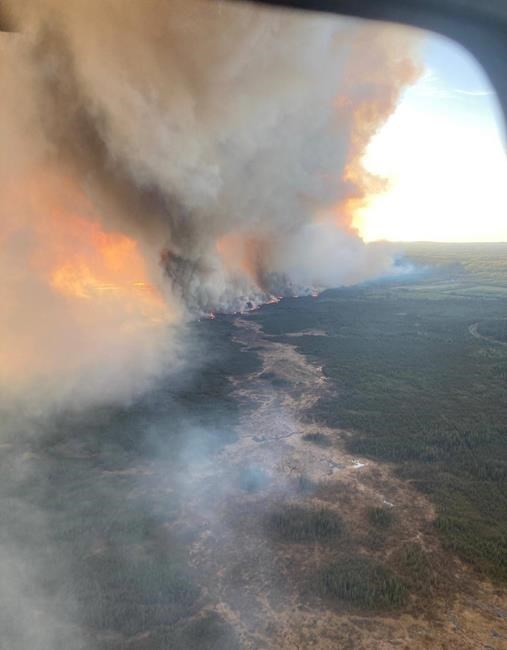FORT NELSON, B.C. — The northeastern British Columbia municipality where thousands have evacuated due to a fast-growing wildfire nearby urged all remaining residents to leave immediately Saturday despite improving weather conditions.
In a joint statement, the Northern Rockies Regional Municipality and Fort Nelson First Nation said that people staying behind despite the evacuation orders should be aware that "emergency medical services are not available, nor are groceries or other amenities."
"Utilities may become impacted to support fire response efforts," the statement said. "Communication networks are precarious, which could impact the ability to reach residents to advise of changing conditions."
The statement came as the Parker Lake blaze reached almost 17 square kilometres in size on Saturday, more than doubling the eight square kilometres reported just hours earlier, with BC Wildfire Service maps showing the fire burning just a few kilometres west of Fort Nelson's city limits.
Northern Health said in a release that Fort Nelson General Hospital has been safely evacuated and is closed until further notice.
The health authority said the hospital's patients have been relocated to facilities in Fort St. John and Dawson Creek.
Northern Rockies Regional Municipality Mayor Rob Fraser said most of the 3,500 residents in and around Fort Nelson, B.C., have been evacuated since the Parker Lake fire broke out on Friday, but police are knocking on doors to ensure everyone got out.
"We got hardly any pushback," Fraser said regarding Fort Nelson residents' reaction to the order to evacuate. "I'm still waiting for word from the RCMP with respect to how many people might be left in the community, but their initial discussions with me said it was very few."
Evacuations for the Northern Rockies Regional Municipality and Fort Nelson First Nations were issued late Friday after the fire grew from an initial reported size of half a square kilometre at 5:25 p.m. to four square kilometres by 6:30 p.m., then continued to grow exponentially since.
On social media, Fort Nelson residents' videos and photos show thick plumes of smoke rising high into the sky with houses in the foreground, with some pictures revealing a haze covering the region.
Fort Nelson resident Bud Streeper posted a video update from the area on Saturday, saying that the winds that had whipped the Parker Lake wildfire into exponential growth on Friday night diminished overnight, reducing fire activity around the town.
In an earlier video Friday, Streeper outlined how he had prepared buildings on his property as the fire grew nearby.
"So all of this property that you are seeing here right now, you can see it's soaking wet," Streeper said, showing a number of buildings as wildfire smoke was visible in the background. "My house has been soaked with a million gallons. Now we've moved over to my old property now … that thing is taking the paint off of them old buildings. That's how much water we're putting down over there."
Streeper did not respond to requests for comment.
Fraser said the Parke Lake fire is one of three major wildfire near Fort Nelson, and what surprised residents was the "very dark" smoke rising from a close distance to the town, prompting the evacuation order.
The wildfire has also knocked out 911 service and disrupted telecommunications in Yukon and Northern B.C., with officials in the territory asking Whitehorse residents needing help to go directly to the local RCMP detachment, fire halls or ambulances stationed throughout the city.
Fraser said the fire was started by a tree blown down by strong winds falling onto a power line.
The update from the Northern Rockies Regional Municipality Saturday said the fire situation "remains volatile and fast-moving." Officials urged any remaining residents of Fort Nelson to evacuate.
Residents were initially told to flee to Fort St. John some 380 kilometres to the southeast on Friday, and the municipality's update said those with the means to travel further are urged to go another 440 kilometres south to Prince George, B.C., where a reception centre has been opened.
Fraser said the fire's pace has since slowed, with winds calming significantly and reducing the blaze's rate of spread, but officials are uncertain when the evacuation order will be lifted.
Environment Canada says winds around Fort Nelson have dropped to as low as two kilometres an hour Saturday after reaching as high as 59 kilometres an hour on Wednesday.
The high winds pushed smoke from the blaze across northeastern B.C. and into parts of Alberta on Saturday, putting Edmonton under an air quality advisory with hazard levels rated at 10-plus — or "very high risk" — forecast throughout Saturday.
Meteorologist Heather Rombough said most of the smoke blanketing the city is from the B.C. wildfire, and residents should stay indoors or at least avoid strenuous activity outside until air quality improves.
Fort Nelson is located in the far northeastern corner of B.C. about 1,600 kilometres from Vancouver.
Environment Canada is not forecasting rain in the area until Wednesday evening and is predicting only a 60- per cent chance of showers for that night and Thursday.
"It doesn't look like there's going to be much precipitation through that area for the next couple of days at least, unfortunately," Rombough said. "By early next week there might be a little bit, but really nothing significant."
This report by The Canadian Press was first published May 11, 2024.
Chuck Chiang, The Canadian Press




